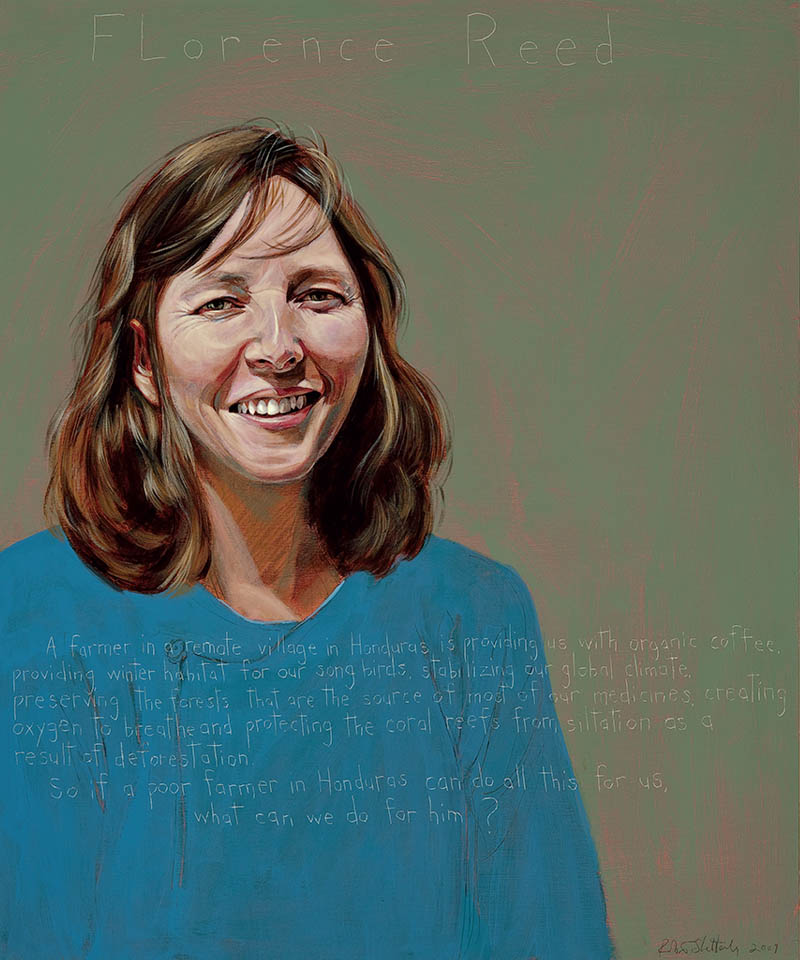
Florence Reed
Environmental Activist for Sustainable Farming and Rain Forest Protection : b. 1968
“A farmer in a remote village in Honduras is providing us with organic coffee, providing winter habitat for our song birds, stabilizing our global climate, preserving the forests that are the source of most of our medicines, creating oxygen to breathe and protecting the coral reefs from siltation as a result of deforestation. So if a poor farmer in Honduras can do all this for us, what can we do for him?”
Biography
Awarded the 2012 Sargent Shriver Award for Distinguished Humanitarian Service from the National Peace Corps Association.
Received the 2009 Distinguished Service Medal from the Garden Club of America.
A farmer clears a few acres of rainforest and plants corn and beans, growing just enough to feed his family. Each year, yields are a little smaller, the soil a little more depleted. After a few years, the family moves on, leaving behind a moonscape of barren soil. On a new patch of land, the process begins again, slashing and burning rainforest to create a new field.
“I saw the rainforest destruction—and the poverty—with my own eyes,” says Florence Reed, who joined the Peace Corps when she graduated from the University of New Hampshire. She was stationed in Central America, where more than half the rainforest has been destroyed in the last 50 years.
Reed drew on her degree in environmental conservation, as well as on her own informal research, to facilitate reforestation efforts for villagers in Santa Rita, Panama. She was pleased with the results of the reforestation efforts. But she also realized that the forests would continue to be destroyed unless farmers were given significant technical assistance. Learning sustainable farming practices would allow them to grow on the same land every year and keep them from burning new swaths of forest. That realization sparked Reed’s determination to devote her life to saving the rainforest.
She launched Sustainable Harvest International (SHI) out of a spare bedroom in her parents’ New Hampshire home in 1997. Since those early days that were fueled by Reed´s vision and a little start-up funding, SHI has reached more than 1800 families in 120 communities in Honduras, Belize, Nicaragua and Panama. SHI farmers have helped to save thousands of acres of tropical forest, planted 2.5 million trees and raised their income by as much as eight-times.
“As far as I know, we are the only organization in the world providing long-term technical assistance to rural families in the tropics, offering them alternatives to slash-and-burn agriculture,” says Reed, who shuttles back and forth between two very different worlds. In Central America, she makes her way by burro, by boat and by foot to villages deep in the rainforest. During the rainy season, she has been stuck thigh-deep in mud. “This is when it dawns on me what it means to be the director of an international nonprofit,” she laughs. The other half of Reed’s time is spent in the United States visiting donors, reporting on SHI’s progress and hoping for more funding to expand the work. As President of the organization, Reed spends her time bringing together a wide variety of individuals to create a better future, including Central American farmers, Central American staff, board members, US staff, donors and other supporters. In recent years she has received an honorary doctorate for her work, along with many awards such as the Yves Rocher Women of the Earth award and the Etown E-chievement award. She was chosen to be a Delegate at the 2009 Opportunity Collaboration, a 4 day conference where some of the world’s major agents of change explore ways to turn the tide of poverty.
“When people work together, things change for the better,” says Reed. “I know that together we can expand peoples’ realization that we can all have a role, big or small, in making the world a better place.”
Programs
Americans Who Tell the Truth (AWTT) offers a variety of ways to engage with its portraits and portrait subjects. Host an exhibit, use our free lesson plans and educational programs, or engage with a member of the AWTT team or portrait subjects.

Education
AWTT has educational materials and lesson plans that ask students to grapple with truth, justice, and freedom.

Exhibits & Community Engagement
AWTT encourages community engagement programs and exhibits accompanied by public events that stimulate dialogue around citizenship, education, and activism.